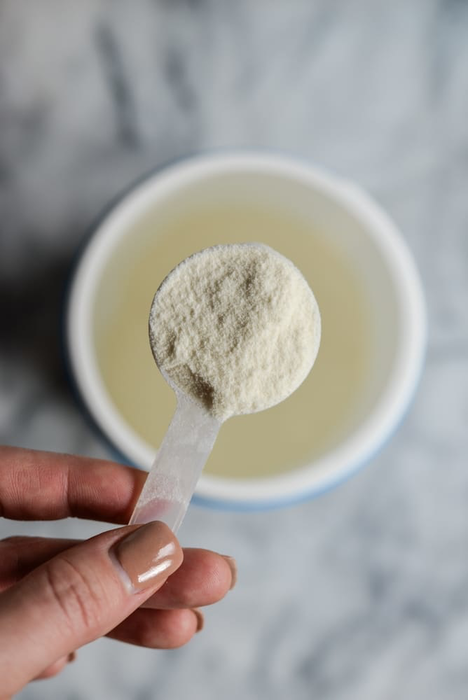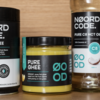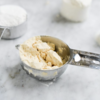MCT Powder vs. MCT Oil — Which One Should You Choose?

Are you in doubt between buying an MCT oil or NoordCode's latest edition, the Pure C8 MCT Powder, and don't know what to base your choice on? We explain the differences and how to incorporate our Pure C8 MCT Powder in your daily routine.
But, first, let's start with a brief explanation of what MCTs actually are—perhaps you're not at all familiar with the term or want to know more about it.
What are MCTs?
MCT fatty acids are converted into energy in the body. Long-chain fatty acids are converted into energy more slowly. This means that the shorter the chain, the better, but only up to a point. So the amount of MCTs determine how quickly your body can absorb them and convert them into ketone production (think: fat burning and energy).
A brief ranking of MCTs based on how many ketones the body produces with them:
- C6: Capronic acid (not found much in coconut oil): is converted to ketones very quickly, but is poorly tolerated by the intestines. C6 is found in poorly purified MCT oils and is likely to cause problems when ingested. C6 does not seem to taste good, which alone is a good reason to avoid it.
- C8: Octanoic Acid: Well tolerated by the intestines and is quickly converted to ketones. About 6% of coconut oil is C8. It has no flavor itself, but can enhance other flavors.
- C10: Decanoic Acid: Is tolerated after a period of habituation, so don't run out of steam (think: an acute toilet visit)! Is less likely to be converted to ketones than C8, but still pretty good. About 9% of coconut oil is C10. Like C8, has no flavor of its own, but may act as a flavor enhancer.
- C12: Lauric Acid: C12 has a "medium" length, but does not behave like an MCT in the body. Converts to ketones about as fast as longer non-MCT fats (not very fast, that is). C12 has other benefits, such as anti-microbial properties. C12 just doesn't help make ketones very much. About 50% of coconut oil is made up of lauric acid.
The C represents the number of carbon atoms that make up the fat. So C8 has 8 carbon atoms.
How is MCT powder made?
MCT powder is made from MCT oil using a process called spray drying. Manufacturers use specialized industrial equipment to bind MCT oil to a microscopic fibrous carrier powder (in North Code's version, this is acacia fiber), which converts the liquid MCTs into a solid, powdered form.
During spray drying, the two components are mixed together and reduced to powder. The end result is a dietary supplement with all the benefits of MCT oil that is portable, easy to mix into smoothies and other beverages, and suitable for use in (baking) recipes.
MCT Oil VS. MCT Powder
While MCT oils and MCT powders both offer the same benefits to your health goals, there are pros and cons to every type of MCT supplement.
Disaster pants
An overconsumption of MCT oil can lead to high distress, but also to nausea and stomach complaints. An MCT powder is easier to tolerate and therefore recommended for people who have previously experimented with the oil form and experienced discomfort.
Ease
A (glass) bottle of MCT oil can still leak - and is heavy - and therefore less easy to export. Bulletproof has made 15ml travel packs before, but a jar of MCT powder is more durable and just as easy to take with you on a trip or to the office.
Texture and blending
Adding MCTs to coffee or other beverages is a great way to boost fat intake and satisfy hunger. But, MCT oil mixes poorly and gives a greasy result. The powder forms blend much easier and gives a creamy texture as a final result.
Science
Studies on MCT powders and their effects are still scarce because this is a relatively new product on the market. However, a 2017 study showed that an emulsified MCT powder supplement is more ketogenic and has fewer side effects than conventional MCT oil. [1]
How do you distinguish a quality MCT supplement?
Whether you choose oil or powder, choosing a quality MCT supplement is essential. Low-quality MCT powders often use starch or other fillers. MCT oils do not contain fillers, but cheap MCT oil that is poorly produced may have had to deal with excessive heat, low-quality MCTs and impurities.
Low-quality MCT powders are counterproductive; they raise your blood sugar, negatively affect your energy levels, create digestive problems, and block ketone production - which is probably why you use the MCTs (and powdered form).
These are the characteristics of a quality MCT powder supplement. Include them in your search and don't purchase just anything until you've ticked off the following points of interest. Only high-quality MCTs:
- Are made from 100% coconut oil. Palm oil or a mixture of coconut oil and palm oil are no-go's.
- Contain only caprylic acid (C8) and capric acid (C10)
- Are refined by low-heat processing to preserve nutritive and enzymatic qualities of the oils
- Are without corn fiber or maltodextrin-based carriers, but use natural, fiber-based carriers (acacia fiber) instead
- Do not contain emulsifiers, preservatives, thickeners, coloring agents or additives
- Use healthy ingredients for added flavor (but opt for a flavorless version)
Besides natural ingredients to add flavor, only two ingredients should be listed on the label: medium-chain triglycerides and a carrier (preferably acacia fiber).
If you can't verify that an MCT powder supplement meets these criteria, look elsewhere. Spending a little extra on a quality product can help you reap the full benefits of MCTs.
And what are these benefits?
We explain some of them.
How MCT oil affects your brain.
MCT oil has been shown to significantly improve memory and overall brain health in people with functional brain problems such as brainfog [2] and even people with mild to moderate Alzheimer's disease who had the APOE4 gene [3].
How MCT oil can help with ketosis.
Limiting carbs and increasing healthy fats like MCT is the secret to ketosis (converting your body into a fatburning machine). [4]
MCT oil is absorbed quickly, which increases energy, and is an easy way to increase ketones. [5] These fats are so good at increasing ketosis that they continue to do their job even in the presence of a higher intake of carbohydrates (e.g., paired with a plate of rice). [6]
How MCT oil boosts your immune system.
Lauric acid (C12) and caprylic acid are mainly found in coconut oil and you won't easily find them in an MCT oil or powder. However, it is interesting to mention them because they are often used by health care providers to fight bacteria, viruses and fungi. Caprylic Acid Capsules are you see back part of a candida treatment. [7]
How MCT oil improves a workout.
Want to take your workouts to the next level? Research has shown that supplementing with MCT oil, the amino acid leucine (found in collagen powder, among others), and vitamin D increases muscle strength. [8]
How MCT oil can help you with weight loss.
It works like this:
- They make you feel fuller faster, so you need to eat less. [9]
- They increase your metabolic rate. [10]
- They reduce the conversion of excess carbohydrates into fats. [11]
And we list some more benefits
MCT oils help you absorb omegas better [12], balance blood sugar [13], balance cholesterol [14] and keep your liver healthy [15].
In short, plenty of reason to start with MCT supplementation.
How to apply MCTs in your daily routine
Want to know how to apply NoordCode’s Pure C8 MCT Powder to your daily routine? We will give you some ideas.
- During fasting: strict fasting does not allow calories - some argue that even tea and black coffee is not allowed - but with a mild form of fasting you can use a teaspoon of MCT powder or oil to increase ketone production, suppress your appetite and thus prolong fasting.
- In beverages: a scoop of MCT powder in your coffee, tea, juice or smoothie gives you satiety and adds a creamy texture. You'll find some special recipes for a Bulletproof coffee here.
- In meals: you can add MCT powder to meals. Not to top your steak with, but a stew or soup will do. The powder is heat resistant up to 180 degrees, tasteless and acts as a thickener.
- In baked goods: because the powder is heat resistant, it makes an excellent ingredient to use in keto treats.
- Pre- and post-workout: MCT powder acts as a great pre-workout supplement. It improves focus during the workout and enhances physical performance. You can add it to a smoothie or mix it with water or other beverages pre-workout, or use it after a workout to stimulate recovery.
- In combination with other supplements: you can use MCT powder with exogenous ketones to further stimulate ketone production. In combination with collagen it reduces inflammation and promotes healing.
Conclusion
Whether you go for a powder or the oil: both give you the health benefits. A MCT powder has a creamy taste, is easier to travel or use in the office, and you'll most likely avoid disaster pants. The downside is that a powder form is more expensive than an oil and all the research into the health benefits has been done with an oil. Whatever you choose, always go for high quality.




